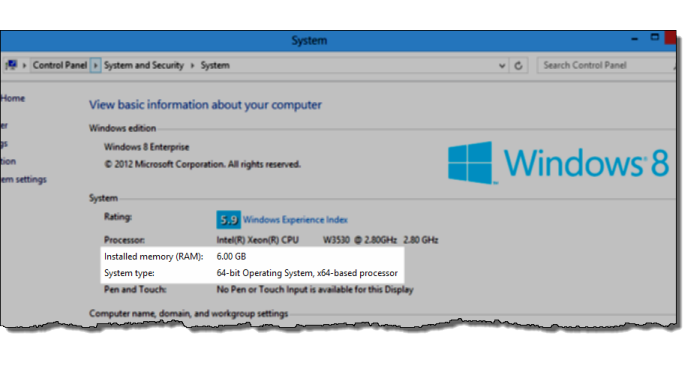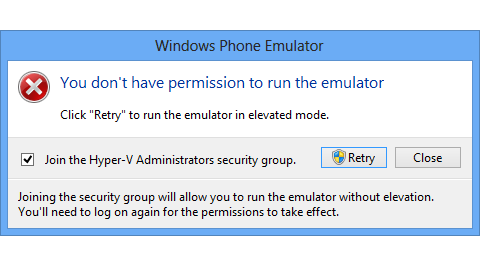System requirements for the Visual Studio Emulator for Android
Applies to: ![]() Visual Studio
Visual Studio ![]() Visual Studio for Mac
Visual Studio for Mac
Note
This article applies to Visual Studio 2017. If you're looking for the latest Visual Studio documentation, see Visual Studio documentation. We recommend upgrading to the latest version of Visual Studio. Download it here
Visual Studio Emulator for Android runs as a virtual machine on Hyper-V, the virtualization technology for Windows 8 and later versions. To run the emulator, your computer must meet the requirements to run Hyper-V as described in this topic.
The setup program tries to configure these prerequisites for you silently when you install the emulator. When setup successfully configures the prerequisites, the emulator simply works as expected. Otherwise you may have to enable these prerequisites manually. If you have to configure the prerequisites manually, the steps and tools are the same steps described here for the Windows Phone Emulator.
Important
The setup program for the emulator checks the prerequisites for running Visual Studio Emulator for Android. It displays warnings if the prerequisites are not present, but it does not require them.
Quick checklist
Here is a quick checklist of the requirements for running the Visual Studio Emulator for Android. For more detailed info, see the subsequent sections in this topic.
System requirements
Hyper-V support (see Hyper-V requirements below)
6 GB or more of RAM.
64-bit version of the Pro edition of Windows 8, Windows 8.1, Windows10 or higher
A processor that supports SSSE3 or later.
Network requirements
DHCP
Automatically configured DNS and gateway settings
Hyper-V requirements
In the BIOS, the following features must be supported:
Hardware-assisted virtualization
Second Level Address Translation (SLAT)
Hardware-based Data Execution Prevention (DEP)
In Windows, Hyper-V must be enabled and running.
You have to be a member of the local Hyper-V Administrators group.
System requirements
Your computer must meet the following requirements:
Hyper-V support (see Hyper-V requirements)
6 GB or more of RAM.
64-bit version of the Pro edition of Windows 8, Windows 8.1, Windows10 or higher.
To check requirements for RAM and Windows, in Control Panel, choose System and Security, and then choose System.

Network requirements
Your network must meet the following requirements:
DHCP
The emulator requires DHCP because it configures itself as a separate device on the network with its own IP address.
Automatically configured DNS and gateway settings
It's not possible to configure DNS and gateway settings manually for the emulator.
To troubleshoot networking issues in the emulator, see the following topics:
Hyper-V requirements
Hyper-V requirements in the BIOS
Your computer's BIOS must support the following requirements, and they must be enabled:
Hardware-assisted virtualization
Second Level Address Translation (SLAT)
Hardware-based Data Execution Prevention (DEP)
Hyper-V requirements in Windows
When your computer and BIOS settings are already configured to support Hyper-V, the setup program enables and starts Hyper-V. Otherwise you may have to enable these requirements manually.
| Requirement | How to check and enable this requirement |
|---|---|
| Hyper-V must be installed | Follow the same instructions used to enable Hyper-V for the Windows Phone emulator. Check the status of the Hyper-V Virtual Machine Management service in the Services snap-in. |
| Hyper-V must be running. | For more info about managing services, see the following topics: - Start, stop, pause, resume, or restart a service - Configure how a service is started |
You have to be a member of the local Hyper-V Administrators group.
To run the Visual Studio Emulator for Android without a recurring prompt to elevate your rights, you have to be a member of the local Hyper-V Administrators group. If you are already a local administrator on the computer when you install the SDK, the setup program for the SDK adds you to the Hyper-V Administrators group. Otherwise you may have to enable this requirement manually.
When you run the emulator, if you are not already a member of the Hyper-V Administrators group, you are prompted to join the group (the dialog box refers to the Windows Phone emulator). Joining the group requires administrator rights.
Important
After you join the group, log off or reboot to make the change take effect.

To add yourself to a group manually, open the Local Users and Groups snap-in.
Running the emulator from a bootable VHD is not supported
If you try to run an app on the Visual Studio Emulator for Android while you are running Windows from a bootable VHD, the emulator typically takes several minutes to start or fails to start. When the emulator fails to start, you see the following message: App deployment failed. Please try again.
This configuration is not supported. For information about related issues, see Troubleshoot the Visual Studio Emulator for Android.
Hyper-V requires uncompressed and unencrypted files
On a hard drive configured with the NTFS file system, the virtual hard disk files used by Hyper-V must be uncompressed and unencrypted. Make sure that the following directories are not compressed or encrypted:
%localappdata%\Microsoft\XDE
C:\Program Files (x86)\Microsoft Emulator Manager
C:\Program Files (x86)\Microsoft Visual Studio Emulator for Android
%localappdata%\Microsoft\VisualStudioEmulator
On the ReFS file system, the virtual hard disk files must not have the integrity bit set.
Hardware graphics forwarding (OpenGL ES support) requirements
In order for the emulator to emulate calls to the GPU, such as those used by OpenGL ES, your machine must have a DirectX compatible GPU with appropriate DirectX drivers installed.